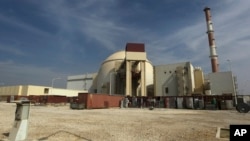A deal to curb Iran’s nuclear program before a Nov. 24 deadline may not be possible, Russian Foreign Ministry spokesman Alexander Lukashevich said on Thursday, while suggesting the talks may be extended.
The P5 plus 1 (the five permanent United Nations Security Council members and Germany) want to ensure Tehran’s nuclear program does not enable it to build nuclear weapons. Iran denies wanting to build a nuclear bomb and said its nuclear work is for civilian needs.
Lukashevich was quoted by Interfax news agency as saying it is possible the talks could be extended. He said while all parties involved in the negotiations are trying to meet the Nov. 24 deadline, “What is more important, a deadline or a real agreement?”
Russia has traditionally had closer ties with Iran than other participants of the talks – the U.S., China, Britain, France and Germany - after building a nuclear power station in Bushehr on the coast of the Persian Gulf.
Assurances for easing of sanctions
The agreement sought by the P5 plus 1 is meant to assure the West that Iran's nuclear program would not be used for military ends. In return, they would agree to a possible easing of sanctions on Iran.
Some diplomats suggested an extension of the negotiations is possible. The talks were extended by four months in July. A senior Iranian official said talks could be extended until March.
French Foreign Minister Laurent Fabius said on Thursday that important questions still needed to be resolved regarding Iran's nuclear program, but that he hoped there was an agreement by Nov. 24.
“I can't make any predictions at this time. I think it will only be on the day of the 24th that we'll be able to make an assessment,” Fabius said.
The minister added that he was setting aside a couple of days and nights to go to Vienna if needed for the end of the Iran talks, which are due to run from Nov. 18-24.
Iran's uranium stockpile
Meanwhile, the U.N. atomic agency has corrected data to lower its estimate of the size of Iran's uranium stockpile, a figure watched during negotiations over Iran's nuclear program.
The International Atomic Energy Agency (IAEA) now estimates that Iran's holding of low-enriched uranium gas is 8,290 kg, 100 kg less than it had said in a confidential report last week, diplomats said on Thursday.
There was no explanation of why the initial figure was wrong, or the significance of the discrepancy, and there was no immediate IAEA comment.
Iran's stock of uranium refined to a fissile concentration of up to 5 percent is a sensitive issue because, if processed much further, the material could provide the explosive core of a nuclear weapon, which Iran has denied trying to develop.
In Friday's report on Iran's nuclear program, the IAEA said the stockpile had grown by 625 kg to nearly 8.4 tons since its previous report in early September.
But in a correction issued to IAEA member states this week both figures were reduced, to 525 kg and 8,290 kg respectively, according to data seen by Reuters.
Iran's uranium stockpile is one of the factors that could determine how much time it would need for any attempt to assemble nuclear weapons. Iran said it only refines uranium to fuel nuclear power plants, but the West wants to make sure the country cannot produce an atomic bomb any time soon.
The IAEA also corrected another figure in its Nov. 7 report, reducing the number of advanced IR-6 uranium enrichment centrifuges installed at its Natanz research and development site to nine from 19.
Some material for this report came from Reuters.

